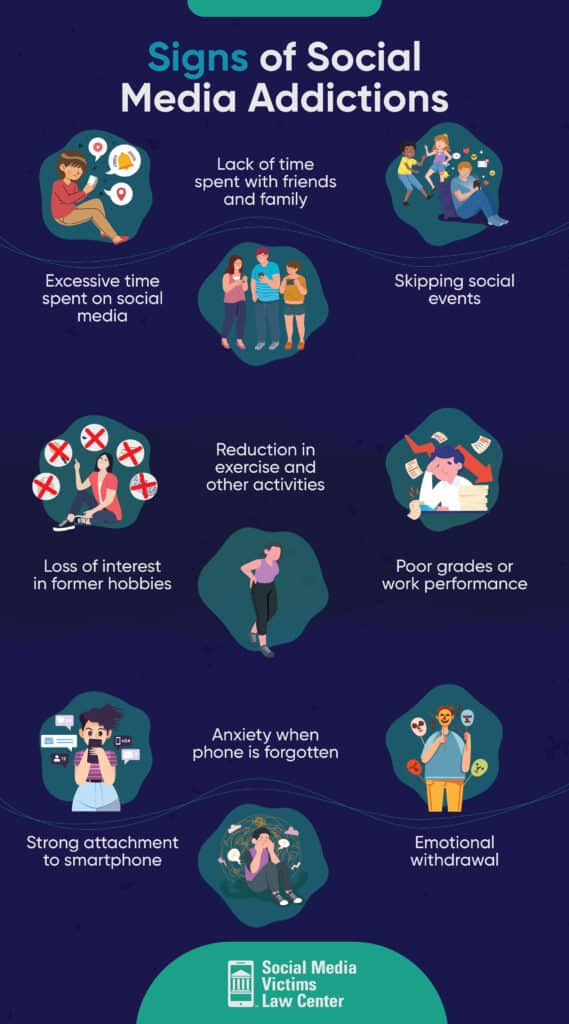Signs of Social Media Addiction
Social media addiction can negatively impact teens and children both mentally and physically. As parents and guardians, understanding the signs of social media addiction is the first step in taking action to protect our youth.


- Content last updated on:
- June 12, 2025
Written and edited by our team of expert legal content writers and reviewed and approved by

- Content last updated on:
- June 12, 2025
What is Social Media Addiction?
Addiction to social media looks much like an addiction to any type of drug or activity–an obsessive urge to engage with social media that can interfere with other life activities and lead to mental health problems.
Know the Signs of Social Media Addiction
The primary way for parents to identify a social media addiction in their children is when they notice that it has started to take a toll on other areas of life.
Here are nine common symptoms of social media addiction:
Excessive amounts of time spent on social media
Spending a lot of time scrolling through social media platforms, neglecting other important responsibilities and activities.
Lack or reduction of time spent with friends and family
As social media addiction grows, personal relationships may deteriorate because individuals prefer spending more time online. They might distance themselves from family and friends and find it challenging to be fully present since most of their attention is directed towards social media.
Skipping social events
Frequently opting out of social gatherings and events in favor of staying connected to social media.
Loss of interest in former hobbies
Finding once-enjoyed activities less appealing or abandoning them altogether due to the allure of social media.
Reduction in exercise and other activities
Decreasing physical activity and participation in hobbies or leisure pursuits due to excessive social media use.
Poor grades or work performance
As social media takes up a significant portion of a young person’s time and energy, it can lead to neglecting school or work-related responsibilities, resulting in a decline in academic or professional performance.
Strong attachment to his or her smartphone
A deep emotional connection to one’s smartphone, often using it as the primary means to access and engage with social media.
Anxiety when the phone is forgotten or taken by parents
Experiencing anxiety or distress when separated from one’s smartphone, especially if it’s taken away temporarily, is indicative of social media addiction signs.
Emotional withdrawal
Becoming emotionally distant or disconnected from real-world interactions, as a result of overindulgence in social media.
Teen Social Media Addiction Lawsuits
Is your teen struggling with an addiction to social media? Know your legal options.


Symptoms of social media addiction can vary widely among individuals. Not every youth or teen struggling with social media addiction will exhibit all of these signs.
Social media addiction shows up differently in different people. In part, this has to do with the individual’s reasons for the dependence on social media. Does he or she have high levels of stress that social media helps to avoid? Or is there a pre-existing chemical imbalance that makes the dopamine hit more appealing than it is for others?
Every person is different. However, methods for reducing a dependency on social media, along with recognizing and addressing social media addiction symptoms, are fairly universal. In the age of smartphone overuse, aiming to consciously reduce social media use can be a healthy choice for everyone.
Who is Most Prone to Social Media?
Younger generations, including Millennials and Generation Z, are among those most prone to social media. Their experiences with social media are diverse and influenced by factors such as their age, interests, and online interactions
This is because they have grown up in a digital age and are more comfortable with technology and online communication. Social media platforms offer them a means to connect with peers, stay updated on trends, and express themselves. Moreover, individuals who crave social validation and approval may also be more prone to social media use, as these platforms provide a platform for garnering likes, comments, and shares, which can boost self-esteem and a sense of belonging.
Furthermore, the influencer culture and the accessibility for individuals to participate in content creation have made social media especially appealing to younger generations.
Instagram and TikTok, in particular, send users the message that anyone can become famous with the right content and enough followers.
Conversely, those who prefer face-to-face interactions and older generations less accustomed to technology may use social media less frequently. In essence, social media usage depends on individual traits, generational factors, and personal preferences.
Causes of Social Media Addiction
Researchers know that social media use is inherently tied to dopamine production. Dopamine is a chemical produced in the brain that impacts motivation.
When today’s youth engage with interesting or humorous content on social media, or when they like and comment on posts, the brain creates dopamine. Continued scrolling leads to continued dopamine production. When the phone is finally put down, dopamine production stops.
With balanced use of social media, a young individual can continue with the day and find motivation–and dopamine–from other activities, like going for a run, folding the laundry, or meeting up with a friend.
For some teens, the attraction to social media is so strong that it becomes difficult to produce dopamine–and thus find motivation or interest–in anything outside of social media.
There are many reasons that social media can have this effect on some young users. Elements that often contribute to social media addiction include:
- Sense of community and inclusion found online
- Idealization of influencer culture
- Fear of missing out on interactions between peers
- Distraction from real-life stressors
- Lack of meaningful relationships
- Mental health struggles
Getting Help with Social Media Addiction

Helping an individual, whether it’s a teen or a self-aware young adult, in breaking a social media addiction is a three-part process. As a whole, the goal is to help the individual re-develop a connection to life. Real life doesn’t happen through the glass screen of a smartphone.
Ultimately, when a person can feel these signs and act upon them, social media loses its importance as healthier habits are consciously created.
1. Digital Detox
If you’re a parent concerned about your child’s social media addiction or a young adult recognizing the problem yourself, the first step is to reduce the time spent online. This can extend to screen time in general. Watching television and surfing the internet have many of the same effects as using social media.
A digital detox is one way to develop healthy boundaries around social media use. Set limits on the amount of time social media should be used. It can be helpful to have a designated place to put a smartphone outside of scheduled social media time. Be mindful that a digital detox may induce social media withdrawal symptoms, similar to those of a drug or alcohol detox.
2. Restore Balance
If social media use has advanced to the point that it seems addictive, it has probably taken a toll on other areas of life. In addition to reducing smartphone use, it’s helpful to consciously identify the areas of life that have been neglected and turn attention to them.
If relationships have been neglected, arrange social time with family or friends. If exercise has fallen by the wayside, put it on the schedule. If your teen’s grades have suffered, encourage him or her to invite friends over for study time.
In working to counter social media addiction signs, the most powerful tool is building community and fostering real-world human relationships.
3. See a Specialist
Several studies have found a strong correlation between social media use and increased levels of depression, anxiety, and stress.
In some cases, social media can be a welcome distraction from a pre-existing mental health condition. In other cases, a social media addiction can cause depression and anxiety, especially when it takes a toll on relationships, hobbies, or grades.
Not every person with a social media addiction is necessarily depressed. However, it’s worth considering whether counseling, medication, or a combination can help an individual find a renewed interest in life.
If you or a loved one has been harmed by a social media addiction, contact us for a free case evaluation.
Contact Us Today
Related Pages
Client Testimonials
Is Your Child Addicted to Social Media?
You Are Not Alone.
We have helped hundreds of families just like yours whose children and teens were affected by social media addiction.
